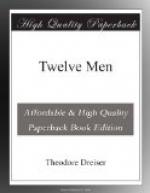“What makes you say that?” I asked.
“Well, there used to be a man over here at Danville that I always thought would get up, and yet he didn’t. He was the finest orator I ever heard.”
“Who was he?” I asked.
“Arch White,” he said quietly. “He was really a great man. He was a good man. Why, many’s the time I’ve driven fifteen miles to hear him. I used to like to go into Danville just for that reason. He used to be around there, and sometimes he’d talk a little. He could stir a fellow up.”
“Oratory alone won’t make a statesman,” I ventured, more to draw him out than to object.
“Oh, I know,” he answered, “but White was a good man. The plainest-spoken fellow I ever heard. He seemed to be able to tell us just what was the matter with us, or at least I thought so. He always seemed a wonderful speaker to me. I’ve seen as many as two thousand people up at High Hill hollerin’ over what he was saying until you could hear them for miles.”
“Why didn’t he get up, then, do you suppose?” I now asked on my part.
“I dunno,” he answered. “Guess he was too honest, maybe. It’s sometimes that way in politics, you know. He was a mighty determined man, and one that would talk out in convention, whatever happened. Whenever they got to twisting things too much and doing what wasn’t just honest, I suppose he’d kick out. Anyhow, he didn’t get up, and I’ve always wondered at it.”
In Danville one might hear other stories wholly bearing out this latter opinion, and always interesting—delightful, really. Thus, a long, enduring political quarrel was once generated by an incident of no great importance, save that it revealed an odd streak in the old patriarch’s character and his interpretation of charity and duty.
A certain young man, well known to the people of this county and to the patriarch, came to Danville one day and either drank up or gambled away a certain sum of money intrusted to him by his aunt for disposition in an entirely different manner. When the day was all over, however, he was not too drunk to realize that he was in a rather serious predicament, and so, riding out of town, traveled a little way and then tearing his clothes and marking his skin, returned, complaining that he had been set upon by the wayside, beaten, and finally robbed. His clothes were in a fine state of dilapidation after his efforts, and even his body bore marks which amply seconded his protestation. In the slush and rain of the dark village street he was finally picked up by the county treasurer seemingly in a wretched state, and the latter, knowing the generosity of White and the fact that his door was always open to those in distress, took the young man by the arm and led him to the patriarch’s door, where he personally applied for him. The old patriarch, holding a lamp over his head, finally appeared and peered outward into the darkness.
“Yes,” he exclaimed, as he always did, eyeing the victim; “what is it you want of me?”




